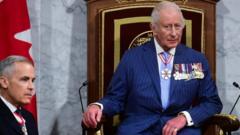The speech outlines Canada's commitment to trade relationships, infrastructure development, and addressing pressing social issues like housing and crime.
**Canada's Vision for the Future: Key Insights from King Charles's Throne Speech**

**Canada's Vision for the Future: Key Insights from King Charles's Throne Speech**
King Charles's address highlights Canada's strategic goals amid global challenges and domestic concerns.
In a defining moment for Canada, King Charles delivered the Speech from the Throne, underscoring the nation's aspirations in an unstable world and its intricate relationship with the United States. This address sought to provide a clear roadmap for Prime Minister Mark Carney's government, emphasizing priorities that include bolstering trade links, enhancing military capabilities, and embarking on significant infrastructure initiatives.
The King's speech was particularly poignant in its message of sovereignty, indirectly addressing US President Donald Trump’s previous remarks about Canada's autonomy. Despite not naming Trump, the speech encapsulated national pride, beginning with a declaration of "pleasure and pride" found in Canada's unity and resilience. King Charles commended the growth of Canada since the last throne speech by Queen Elizabeth II in 1955, recognizing the nation as "a bold, ambitious, innovative country."
A notable highlight from the address was the acknowledgment of Canada's evolving place in a world beset by challenges. The King pointed out that while the global trade landscape was changing, it presented a pivotal opportunity for Canada—a chance to transform its economy and reinforce vital trading relationships, particularly with European allies. He asserted that this moment "is also an incredible opportunity" for the country.
Delving into domestic policy, King Charles discussed Carney’s plans to confront economic hurdles, emphasizing infrastructure speed-ups and initiatives aimed at boosting Indigenous participation in major projects. The government is also looking to eliminate interprovincial trade barriers, which are estimated to cost Canada as much as C$200 billion annually.
Housing affordability has surged to the forefront of national issues, with soaring prices affecting many Canadians. Carney's government seeks to address this crisis by constructing 500,000 new homes annually and proposing innovative housing solutions through prefabrication and incentives for first-time buyers, including the abolishment of certain taxes.
Crime and safety were also focal points in the address, with commitments to impose stricter penalties for offenses like human trafficking and drug smuggling, responding to public demand for a safer environment.
Lastly, the speech underscored Canada's dedication to increasing its military spending, responding to pressures from NATO allies and a commitment to meet the 2% GDP defense spending target by 2030. The government also aims to reinforce strategic defense ties with allies while considering participation in new missile defense initiatives.
King Charles’s visit and the throne speech thus symbolized more than just tradition; they articulated a vision for a robust, united Canada prepared to navigate the complexities of the 21st century.





















